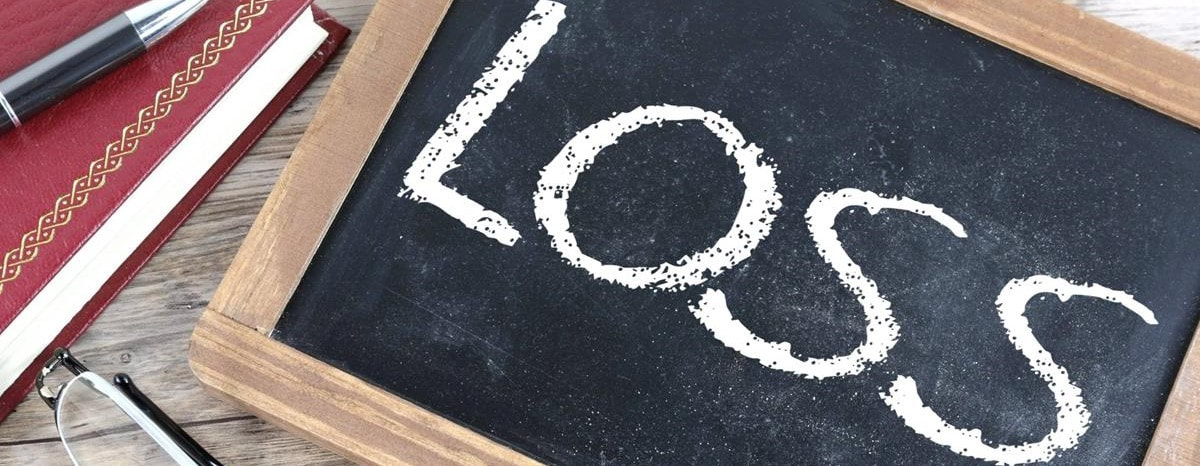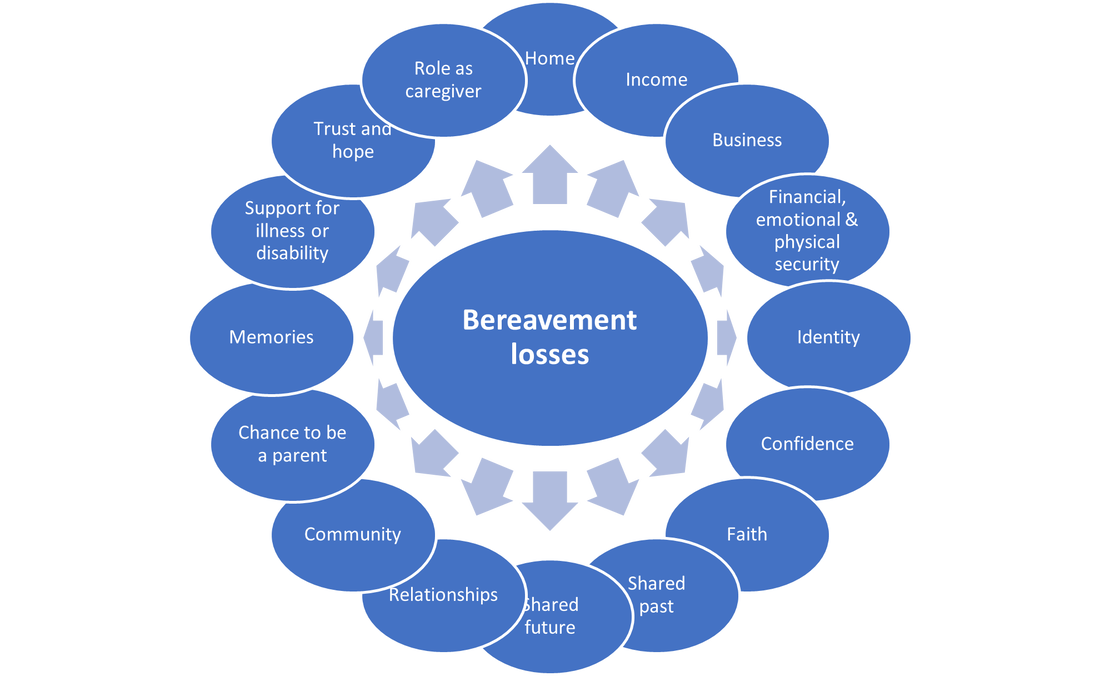|
When we are widowed, everyone is aware of the biggest loss – the loss of our partner. But there are secondary losses as well, and one of these is the loss of role.
When my mother died, my father never really got over her loss. As well as losing the person he’s known since childhood and he’d been married to for over 60 years, he lost his role as her primary carer, and I believe that this had a huge impact on him. He lost his reason to get up in the morning, his reason to look after himself so that he could look after her. And it broke my heart. I helped Tim in his business as a bookseller. People in the village would said ‘oh, you’re the bookshop, aren’t you,’ and it surprised me how much of a loss that was for me.
0 Comments
Widowhood comes with a lot of different secondary losses, and one of these is the sense of losing who we are. When we are in a relationship, however independent we are, our partner becomes part of who we are and how we see ourselves. We are a wife, a husband, a partner, a girl or boyfriend, a significant other, a spouse – whatever name we use for it, we lose this part of us when we are widowed*.
Loss of identity can especially be an issue for people who are widowed early on after a change in a relationship, for example getting married or civil partnered or moving in together, as they haven't had chance to find out who they are in these new situations before having it taken away from them. It may also have a huge impact on people who move a long distance or change countries to be with their partner, as they are a long way from their support networks Some people take a pause from their job or education when they are widowed, or stop working or studying altogether. Some people lose their faith. Some people lose touch with their partner's families, their own families, or their friends. These are all part and parcel of the loss of our identity, and the sense of missing the person we were before our person died. Finding us again Finding us again may be picking up something we did before. This could be something we did before we got together with our partner – perhaps even something we did as a child or teenager. It could be something we did with our partner before their death. This allows us to reclaim a thing we loved, as well as creating continuing bonds with the person we lost. It could be doing something new. I went back to university to do an MA in Writing for Performance. It did me good to be somewhere where no-on knew me as Tim's wife or widow. I created The Widow's Handbook. I made new friends. I even went axe throwing. *Don't forget – you are a widow if you have lost your partner, however long the relationship lasted and whatever the relationship status. Losing a partner is a huge and catastrophic loss, and with it come a whole battery of secondary losses. This includes a loss of confidence and a loss of who we feel we are.
Losing confidence in yourself By taking away the person who was closest to us, bereavement can affect our sense of self, our self-esteem and our view of who we are. It takes our past, our present and our future, and leaves us feeling as if the carpet has been pulled out from under our feet. Losing confidence in your grief Early on in my grief I lots confidence in my ability to grieve. Was I grieving too much or too little? Later on down the road some days I thought I was getting over him too quickly, and other days I thought I was taking too long to move forward. Losing confidence in your health When we lose someone that we are close to, it of course leaves us grieving. It can also remind us of our own health and mortality. This can turn into health anxiety, which is worrying too much about whether you are seriously ill or are going to become seriously ill. It can affect your day-to-day life. Losing confidence in the world The death of our partners, especially when it is sudden and unexpected, can erode our confidence in how the world works. If something that catastrophic can happen without warning, what's to stop all manner of other things happening. This can leave us with a loss of hope, depression and A feeling that life isn't worth living any more. Dealing with loss of confidence
The death of a spouse or partner is different than other losses, in the sense that it literally changes every single thing in your world going forward. When your spouse dies, the way you eat changes. The way you watch TV changes. Your friend circle changes or disappears entirely. Your family dynamic/life changes or disappears entirely. Your financial status changes. Your job situation changes. It effects your self-worth. Your self-esteem. Your confidence. Your rhythms. The way you breathe. Your mentality. Your brain function. (Ever heard the term 'widow brain'? If you don't know what that is, count yourself as very lucky.) Your physical body. Your hobbies and interests. Your sense of security. Your sense of humor. Your sense of womanhood or manhood. EVERY. SINGLE. THING. CHANGES. You are handed a new life that you never asked for and that you don't particularly want. It is the hardest, most gut-wrenching, horrific, life-altering of things to live with. Kelley Lynn Losing our partner is one of the most shattering losses we can go through. But alongside that are all the secondary losses, many of which are unexpected One of the first things I was told about being widowed is that we lose our past, our present and our future. That hadn't even occurred to me. I just thought of what I had lost in the 'now', and the grief and pain that was overwhelming. I then started to find out about the extra losses. I was fortunate in that I had the house, that I could manage on my salary, and that my business was mine, not ours. But some people have to leave the house they shared because they can't afford the rent or mortgage alone, or because they weren't married and it goes to their partner's family.
Some widows lose their jobs because they are not able to return to work through grief, or they worked in their partner's business and are unable to run it alone. These issues may also mean that they have to move away from the area, losing their network of friends and/or family, and their feeling of being part of a community. Bereavement can lead to a loss of faith or belief, and this in turn leads to a loss of a community. Some people lose family, and friends too, because they can't cope with grief, or because of rifts over the cause of death or over money. Losing the role of caregiver can lead to a loss of purpose and feeling that a role is gone. On the flip side, the lost partner may have been the caregiver, leaving the widow both alone and without practical or emotional support. Tim had a phenomenal memory, and though we were only together around a decade, we had known each other since our early twenties. So I have lost so many memories, so much shared language and all our shared stories. I also lost our shared future. All those things we planned to do together. I chose not to have children. But for many widows, losing a partner loses the cherished dream of children together. We lose our emotional supporter, our biggest cheerleader when we lose a partner. But for some widows this is made harder by discovering difficult things after their death, which will be forever unresolved. Dealing with secondary loss is hard, as they often emerge just as we are starting to come to terms with our initial loss and regain our routines. For me, it was a case of going back to my early coping strategies of one breath, one step and one moment at a time, and accepting that I was forever changed by my loss. I also had to understand that these secondary losses were real – just as real as the primary loss. Secondary losses still appear, even four years on. And I catch my breath, and grieve again.  The cost of living is climbing, and that puts a squeeze on all of us. Here are some hints and tips that might help a little, and some of them will help the planet too. People who are widowed don't just lose their partner – they lose their partner's income, and may lose access to their partner's pension and their home. These are part of the secondary losses. Money is the last thing we want to have to worry about while we are grieving. Benefits and grants Make sure that you are claiming all the benefits that you are due. The Citizens Advice Bureau can help. For new widows, there are some specific benefits, including the funeral expenses payment and the bereavement support payment. The support payment is currently only due to husbands, wives and civil partners, but this is set to change in 2022.
Heating, lighting and hot water
Broadband, phone and TV
Food shopping
Cooking
Transport
Shopping
Keeping fit
Budgeting, saving and borrowing
Other
Other resources Citizens Advice: If you are struggling with living costs Martin Lewis' MoneySavingExpert website, including Tips, Tricks and Treats StepChange, a debt charity Money Advice Trust |
AuthorI was widowed at 50 when Tim, who I expected would be my happy-ever-after following a marriage break-up, died suddenly from heart failure linked to his type 2 diabetes. Though we'd known each other since our early 20s, we'd been married less than ten years. Archives
July 2024
Categories
All
|





 RSS Feed
RSS Feed